|
Books Should Be Free Loyal Books Free Public Domain Audiobooks & eBook Downloads |
|
|
Books Should Be Free Loyal Books Free Public Domain Audiobooks & eBook Downloads |
|
Religion |
|---|
|
Book type:
Sort by:
View by:
|
By: Isaac Massey Haldeman (1845-1933) | |
|---|---|
 Christ, Christianity and the Bible
Christ, Christianity and the Bible
| |
 Why I Preach the Second Coming
Why I Preach the Second Coming
| |
By: Isaac Myer (1836-1902) | |
|---|---|
 Scarabs The History, Manufacture and Symbolism of the Scarabæus in Ancient Egypt, Phoenicia, Sardinia, Etruria, etc.
Scarabs The History, Manufacture and Symbolism of the Scarabæus in Ancient Egypt, Phoenicia, Sardinia, Etruria, etc.
| |
By: Isaac of Nineveh (613-700) | |
|---|---|
 Mystic Treatises (Six Treatises on the Behavior of Excellence)
Mystic Treatises (Six Treatises on the Behavior of Excellence)
Isaac of Nineveh was born in Eastern Arabia, a mixed Syriac and Arabic speaking region in Mesopotamia. When he was young he entered a monastery where he devoted his efforts to asceticism. He studied theology for a time and became involved in religious education. When the Catholicos visited him he decided to ordain Isaac as a bishop of Nineveh. However, Isaac did not like the administrative duties and retired again to the hermetical and monastic life in which struggles he eventually died. He left... | |
By: Isaac Samuel Reggio (1784-1855) | |
|---|---|
 A Guide for the Religious Instruction of Jewish Youth
A Guide for the Religious Instruction of Jewish Youth
| |
By: Isaac Watts (1674-1748) | |
|---|---|
 Hymns and Spiritual Songs
Hymns and Spiritual Songs
| |
 A Short Essay Toward the Improvement of Psalmody
A Short Essay Toward the Improvement of Psalmody
| |
By: Isabel C. (Isabel Coston) Byrum (1870-1938) | |
|---|---|
 The value of a praying mother
The value of a praying mother
| |
 The Poorhouse Waif and His Divine Teacher
The Poorhouse Waif and His Divine Teacher
| |
By: Isabella Alden (1841-1930) | |
|---|---|
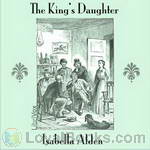 The King's Daughter
The King's Daughter
Dell Bronson has been reared in Boston by her refined uncle and aunt until, at age 18, she is called home by her father, a coarse tavern owner in Lewiston. As a daughter of the heavenly King, she strives to honor her heavenly Father by wooing her earthly father to Christ and away from rum. Set in the era of the temperance movement of the 1800’s. Authored by Isabella M. Alden under the pen name “Pansy.” Third in the Ester Ried series. | |
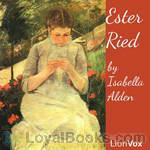 Ester Ried
Ester Ried
Authored by Isabella M. Alden under the pen name “Pansy.” Ester Ried’s life is a dull monotony of toiling at her family’s boardinghouse. She’s overworked, jealous and cranky, a poor example of a Christian to her family and associates. She awakens to a new attitude and commitment due to an extended visit with her cousin. | |
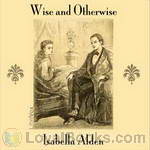 Wise and Otherwise
Wise and Otherwise
Immature Mr. Tresevant (from “The King’s Daughter”) comes to Newton with his spoiled wife to be the new pastor of the church attended by Dr. and Mrs. Douglass, Mr. and Mrs. Sayles, and Mr. and Mrs. Tyndall (from “Ester Ried” and “Julia Ried”), boarding with Jerome and Abbie Sayles. Authored by Isabella M. Alden under the pen name “Pansy.” Fourth in the Ester Ried series. | |
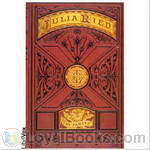 Julia Ried
Julia Ried
Authored by Isabella M. Alden under the pen name “Pansy.” Sequel to “Ester Ried.” Julia Ried must take a job as a bookkeeper in a factory to earn a living. The mistress of her boardinghouse influences her in a negative way, drawing her into a life and attitude displeasing to God. Will her family and friends be able to convince her stand up for what’s right? | |
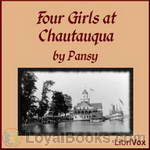 Four Girls at Chautauqua
Four Girls at Chautauqua
Authored by Isabella M. Alden under the pen name “Pansy.” First in the Chautauqua Girls series. Four friends – spoiled, quirky Ruth; fun-loving and mischievous Eurie; poor, independent and brainy Marion; and meek, approval-seeking Flossy – attend Chautauqua on a lark, and their lives are changed forever. (Chautauqua is an adult education movement in the United States, highly popular in the late 19th and early 20th centuries. The Chautauqua brought entertainment and culture for the whole community, with speakers, teachers, musicians, entertainers, preachers and specialists of the day.) | |
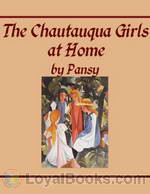 The Chautauqua Girls at Home
The Chautauqua Girls at Home
Sequel to Four Girls at Chautauqua. Ruth, Flossy, Eurie, and Ruth return home as new Christians, eager to begin working. Their new faith clashes with their old lives, which they must overcome, as well as the prejudices of friends and acquaintances. | |
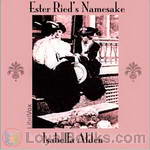 Ester Ried's Namesake
Ester Ried's Namesake
Ester Ried Randall tries to live up to her parents’ expectations and the name she’s been given, but her religion is a chore. Will she learn the lesson of faith that Ester did? Fifth and final book in the Ester Ried series. Authored by Isabella M. Alden under the pen name “Pansy.” | |
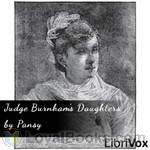 Judge Burnham's Daughters
Judge Burnham's Daughters
Fifth in the Chautauqua Girls series. Ruth Erskine Burnham has helped raise her husband’s two daughters, but all have rejected her faith and values. The constant pressure to compromise has weakened her walk and made her life miserable. Her one comfort is her somewhat sickly 5 year old son. Will she return to the strong faith of her young womanhood, and will her family finally follow? | |
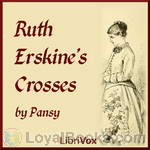 Ruth Erskine's Crosses
Ruth Erskine's Crosses
Third book in the Chautauqua Girls series. Written by Isabella Alden under the pseudonym “Pansy.” Ruth’s father brings home a wife and daughter, after 18 years, that Ruth had never known about. Suddenly she is no longer the queen of her home. And what’s worse, the new mother and sister are rude and antagonistic. How will Ruth bear this cross? | |
By: Isabella Lilias Trotter (1853-1928) | |
|---|---|
 Parables of the Cross
Parables of the Cross
Death is the Gate of Life. There was deep insight in those old words. For man's natural thought of death is that of a dreary ending in decay and dissolution. And from his standpoint he is right: death as the punishment of sin is an ending.But far other is God's thought in the redemption of the world. He takes the very thing that came in with the curse, and makes it the path of glory. Death becomes a beginning instead of an ending, for it becomes the means of liberating a fresh life.And so the hope that lies in these parable lessons of death and life is meant for those only who are turning to Him for redemption... | |
 Parables of the Christ-life
Parables of the Christ-life
| |
By: Isabella M. Alden | |
|---|---|
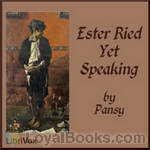 Ester Ried Yet Speaking
Ester Ried Yet Speaking
Authored by Isabella M. Alden under the pen name “Pansy.” Fourth in the Chautauqua Girls series. Alfred Ried (brother of Ester Ried from that series) wants to help the hundreds of poor street boys in his city to come to faith and improve their conditions, but is discouraged and overwhelmed with the task. Enter Flossy (Shipley) Roberts, a willing worker who focuses on 7 such boys and especially on one. | |
By: Israel Zangwill (1864-1926) | |
|---|---|
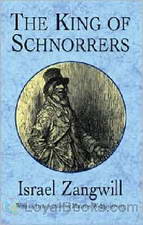 The King of Schnorrers
The King of Schnorrers
Manasseh da Costa is a schnorrer (beggar) who lives on the charitable contributions of the Jews of late 18th-century London. But Manasseh is far from being a humble panhandler for, as every schnorrer knows, supporting the poor is a commandment from God (a mitzvah) not just a favour. And as the descendant of Portuguese Jews who had lived in England for many generations, Manasseh is the social superior of those newly arrived from Eastern Europe (called ‘Tedesco’), even his wealthy patron Joseph Grobstock... | |
 Children of the Ghetto
Children of the Ghetto
In this 1892 novel of London's Jewish East End, Israel Zangwill sets the apparently irrational and decidedly indecorous religious practices of transplanted eastern European Jews against the forces of assimilation. Zangwill's knowledge of Yiddishkeit and skill in melodrama created a series of unforgettable vignettes that had a significant effect on the public perception of this much stigmatized immigrant group. Israel Zangwill (1864-1926) was born in London of Russian and Polish parents. He coined the term cultural "melting pot". | |
By: J Hudson Taylor (1832-1905) | |
|---|---|
 Union and Communion - or Thoughts on the Song of Solomon
Union and Communion - or Thoughts on the Song of Solomon
This little book, whose design is to lead the devout Bible student into the Green Pastures of the Good Shepherd, thence to the Banqueting House of the King, and thence to the service of the Vineyard, is one of the abiding legacies of Mr. Hudson Taylor to the Church. In the power of an evident unction from the Holy One, he has been enabled herein to unfold in simplest language the deep truth of the believer's personal union with the Lord, which under symbol and imagery is the subject of The Song of Songs. (From the Foreword by J Stuart Holden). | |
By: J. A. (Jacob Asbury) Regester (1892-1914) | |
|---|---|
 The Worship of the Church and The Beauty of Holiness
The Worship of the Church and The Beauty of Holiness
| |
By: J. A. MacCulloch (1868-1950) | |
|---|---|
 The Religion of the Ancient Celts
The Religion of the Ancient Celts
| |
By: J. Allanson Picton (1832-1910) | |
|---|---|
 Pantheism, Its Story and Significance Religions Ancient and Modern
Pantheism, Its Story and Significance Religions Ancient and Modern
| |
By: J. C. (Jens Christian) Aaberg (1877-1970) | |
|---|---|
 Hymns and Hymnwriters of Denmark
Hymns and Hymnwriters of Denmark
| |
By: J. C. Ryle (1816-1900) | |
|---|---|
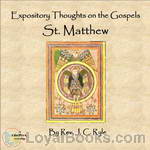 Expository Thoughts on the Gospels - St. Matthew
Expository Thoughts on the Gospels - St. Matthew
“Expository Thoughts” divides the Gospels into sections of about twelve verses each, from which J. C. Ryle selects two or three prominent points to dwell on and bring to the reader’s attention. In Ryle’s day, there were many detailed commentaries and expositions on scripture. In writing these “Expository Thoughts”, Ryle aimed to offer a resource to the laity for use in family prayers, as an aid to those who visit the sick and desire a proper book to read on such occasions, and for private devotions for those whose callings and engagements make it impossible for them to read large commentaries... | |
 Expository Thoughts on the Gospels - St. Mark
Expository Thoughts on the Gospels - St. Mark
“Expository Thoughts” divides the Gospels into sections of about twelve verses each, from which J. C. Ryle selects two or three prominent points to dwell on and bring to the reader’s attention. In Ryle’s day, there were many detailed commentaries and expositions on scripture. In writing these “Expository Thoughts”, Ryle aimed to offer a resource to the laity for use in family prayers, as an aid to those who visit the sick and desire a proper book to read on such occasions, and for private devotions for those whose callings and engagements make it impossible for them to read large commentaries... | |
 Expository Thoughts on the Gospels - St. Luke Vol. 1
Expository Thoughts on the Gospels - St. Luke Vol. 1
“Expository Thoughts” divides the Gospels into sections of about twelve verses each, from which J. C. Ryle selects two or three prominent points to dwell on and bring to the reader’s attention. In Ryle’s day, there were many detailed commentaries and expositions on scripture. In writing these “Expository Thoughts”, Ryle aimed to offer a resource to the laity for use in family prayers, as an aid to those who visit the sick and desire a proper book to read on such occasions, and for private devotions for those whose callings and engagements make it impossible for them to read large commentaries... | |
 New Testament: Being the English Only of the Greek and English Testament
New Testament: Being the English Only of the Greek and English Testament
This New Testament was translated from the Greek by a Christian Universalist evangelist who later fell out of the faith. He was the last person jailed for the charge of blasphemy in the United States, and had many radical views that forced him to question his further involvement in the American Universalist movement. (Introduction by Mark Penfold) | |
 Upper Room: Being a Few Truths for the Times
Upper Room: Being a Few Truths for the Times
Ryle became the first Anglican bishop of Liverpool during a volatile time for the Church of England. Ryle was a strong supporter of the evangelical school and a critic of Ritualism. He was a writer, pastor and an evangelical preacher. Among his longer works are Christian Leaders of the Eighteenth Century (1869), Expository Thoughts on the Gospels (7 vols, 1856–69), Principles for Churchmen (1884). Ryle was described as having a commanding presence and vigorous in advocating his principles albeit with a warm disposition. | |
 Expository Thoughts on the Gospels - St. Luke Vol. 2
Expository Thoughts on the Gospels - St. Luke Vol. 2
“Expository Thoughts” divides the Gospels into sections of about twelve verses each, from which J. C. Ryle selects two or three prominent points to dwell on and bring to the reader’s attention. In Ryle’s day, there were many detailed commentaries and expositions on scripture. In writing these “Expository Thoughts”, Ryle aimed to offer a resource to the laity for use in family prayers, as an aid to those who visit the sick and desire a proper book to read on such occasions, and for private devotions for those whose callings and engagements make it impossible for them to read large commentaries... | |
 Expository Thoughts on the Gospels - St. John Vol. 1
Expository Thoughts on the Gospels - St. John Vol. 1
I send forth the volume now in the reader's hands, with much diffidence, and a very deep sense of responsibility. It is a peculiarly serious undertaking to attempt a Commentary on the Gospel of St. John. This "Commentary" is so extensive that it occupies far more space than the "Expository Thoughts," and is, I must honestly confess, the principal part of the work. To some it may appear far too long and full. But the circumstances of the times are mu justification. We live in a day of abounding vagueness and indistinctness on doctrinal subjects in religion... | |
 Knots Untied
Knots Untied
Being Plain Statements on Disputed Points in Religion, from the Standpoint of an Evangelical Churchman.The volume now in the reader's hands requires a few words of explanation. It contains nineteen papers on subjects which are matters of dispute among English Churchmen in the present day, systematically arranged. A moment's glance at the table of contents will show that there is hardly any point of theological controversy belonging to this era, which is not discussed, with more or less fulness, in these papers... | |
 Two Bears, and Other Sermons for Children
Two Bears, and Other Sermons for Children
”Let no one make you think that you are too young to serve God. That is not true. As soon as you know right from wrong, you are old enough to begin taking the right way. As soon as you are old enough to be punished for doing wrong, you are old enough to give your heart to God, and to follow Christ.” So Rev. Ryle speaks to children of all ages. He does not speak down to children, for even the littlest ones can understand great spiritual truths. Instead, he teaches them in simple language what it means to be a true follower of Jesus and challenges them to live a better life whatever their age by following Jesus’ example – messages we adults could profit from as well... | |
 Hymns and Spiritual Songs
Hymns and Spiritual Songs
In sending forth a new collection of Hymns, I feel it necessary to preface the work by a few words of explanation. The volume now in the reader's hands does not profess to be a complete collection of all the best English hymns. The comfort of invalids and the edification of Christians in private have been the two principal objects I have had in view in preparing this collection. I hold strongly, that holy thoughts often abide for ever in men's memories under the form of poetry, which pass away and are forgotten under the form of prose... | |
 Expository Thoughts on the Gospels - St. John Vol. 2
Expository Thoughts on the Gospels - St. John Vol. 2
The fourteen years which have "passed over" me since I first began writing on the Gospels, I humbly hope have not been thrown away. They have been to me years of many trials, and I may add of much work, much reading, much reflection, and not a little prayer. At the end of these fourteen years, I feel more than ever convinced that what are called "Evangelical" views of Christian truth are thoroughly Scriptural views, and will bear the test of any fair investigation. The longer I live the more firmly I am persuaded that no system of divinity is so entirely in harmony with the Bible, as the system which rightly or wrongly is called "Evangelical... | |
 Practical Religion
Practical Religion
The present volume contains a series of papers about "practical religion," and treats of the daily duties, dangers, experience, and privileges of all who profess and call themselves true Christians. | |
 Old Paths
Old Paths
This book is subtitled “Being Plain Statements on Some of the Weightier Matters of Christianity". The main title comes from the writings the old testament prophet Jeremiah, who refers to the old paths where the good way is, which if people walk in it they will find rest for their souls . Bishop Ryle wrote this book at a time when many in the church were forsaking the old paths of evangelical Christianity in favour of liberal ideas. In Ryle’s day the old doctrines held by the apostolic Christians and reformers had started to be sneered at in certain quarters as being old-fashioned and worn out, and that something more modern was needed... | |
 Expository Thoughts on the Gospels - St. John Vol. 3
Expository Thoughts on the Gospels - St. John Vol. 3
The volume now in the reader's hands completes a work which I began sixteen years ago, entitled "Expository Thoughts on the Gospels." By the good hand of God that work is now finished. For this I desire to be deeply thankful. "Better the end of a thing than the beginning of it." I have now only to commend to my gracious God and Father this feeble attempt to explain a most glorious portion of His revealed Scripture. I do it with humble thankfulness, but with a sense of utter weakness before the power of His word, and of inability to sound the depth even of its simplest sentence... | |
By: J. Dodd (James Dodd) Jackson (1861-1918) | |
|---|---|
 The Message and the Man: Some Essentials of Effective Preaching
The Message and the Man: Some Essentials of Effective Preaching
| |
By: J. E. (John Ebenezer) Esslemont (1874-1925) | |
|---|---|
 Bahá’u’lláh and the New Era
Bahá’u’lláh and the New Era
| |
By: J. E. (Judson Eber) Conant (1867-1955) | |
|---|---|
 The Church, the Schools and Evolution
The Church, the Schools and Evolution
| |
By: J. F. (John Fletcher) Hurst (1834-1903) | |
|---|---|
 History of Rationalism Embracing a Survey of the Present State of Protestant Theology
History of Rationalism Embracing a Survey of the Present State of Protestant Theology
| |
By: J. H. (Joseph Hugh) Beibitz (1868-1936) | |
|---|---|
 Gloria Crucis addresses delivered in Lichfield Cathedral Holy Week and Good Friday, 1907
Gloria Crucis addresses delivered in Lichfield Cathedral Holy Week and Good Friday, 1907
| |
By: J. M. Judy | |
|---|---|
 Questionable Amusements and Worthy Substitutes
Questionable Amusements and Worthy Substitutes
| |
By: J. Manning Potts (1895-1973) | |
|---|---|
 Prayers of the Early Church
Prayers of the Early Church
There are prayers of our Lord, the apostles, the martyrs, and the saints covering the period of the Early Church from its beginning through the fifth century. There are some prayers from each of the first five centuries. The treasure house from which to choose is almost unlimited. It is a vast and fruitful field and anyone is amply rewarded who delves into it.The prayers have been selected primarily for their spiritual and devotional content. Many have been laid aside with regret that they could not be included in this book, but its compass in size is set and only so many can be used... | |
By: J. N. (John Napper) Worsfold | |
|---|---|
 The Vaudois of Piedmont A Visit to their Valleys
The Vaudois of Piedmont A Visit to their Valleys
| |
By: J. Paterson (John Paterson) Smyth (1852-1932) | |
|---|---|
 The Gospel of the Hereafter
The Gospel of the Hereafter
| |
By: J. R. (James Russell) Miller (1840-1912) | |
|---|---|
 Personal Friendships of Jesus
Personal Friendships of Jesus
| |
 Making the Most of Life
Making the Most of Life
| |
By: J. Rendel (James Rendel) Harris (1852-1941) | |
|---|---|
 Memoranda Sacra
Memoranda Sacra
| |
By: J. W. Byers | |
|---|---|
 Sanctification
Sanctification
| |
By: J. W. Keyworth | |
|---|---|
 The Golden Shoemaker or 'Cobbler' Horn
The Golden Shoemaker or 'Cobbler' Horn
| |
By: J. Wilbur (John Wilbur) Chapman (1859-1918) | |
|---|---|
 And Judas Iscariot Together with other evangelistic addresses
And Judas Iscariot Together with other evangelistic addresses
| |
By: Jacob Abbott (1803-1879) | |
|---|---|
 Caleb in the Country
Caleb in the Country
| |
By: Jacob Bryant (1715-1804) | |
|---|---|
 A New System; or, an Analysis of Antient Mythology. Volume I.
A New System; or, an Analysis of Antient Mythology. Volume I.
| |
By: Jakob Andreae | |
|---|---|
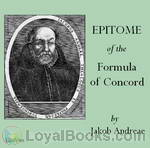 Epitome of the Formula of Concord
Epitome of the Formula of Concord
Formula of Concord (1577) is an authoritative Lutheran statement of faith (called a confession, creed, or "symbol") that, in its two parts (Epitome and Solid Declaration), makes up the final section of the Lutheran Corpus Doctrinae or Body of Doctrine, known as the Book of Concord. The Epitome is a brief and concise presentation of the Formula's twelve articles. | |